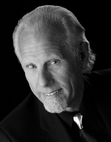U.N.C.L.E. REIMAGINED
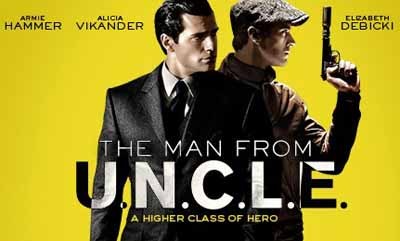 My fellow U.N.C.L.E. fan, Warner Todd Huston, posted a great recap of U.N.C.L.E. history and a non-spoiler review of the new big screen reimagining of The Man From U.N.C.L.E. by director Guy Ritchie, which I think says it all. With his permission, I’m reposting it here...
My fellow U.N.C.L.E. fan, Warner Todd Huston, posted a great recap of U.N.C.L.E. history and a non-spoiler review of the new big screen reimagining of The Man From U.N.C.L.E. by director Guy Ritchie, which I think says it all. With his permission, I’m reposting it here...Review: Guy Ritchie’s Man From U.N.C.L.E.
Warner Todd Huston
The classic 1960s TV show that barely escaped being canceled after its first season yet rose to a level of popularity that rivaled that of The Beatles is finally getting a big screen reimagining and many fans hope it will be successful enough to spawn sequels and a new series of movies. So, how does Guy Ritchie’s new “The Man From U.N.C.L.E.” measure up?
The History
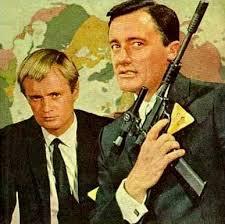 Before we get to the film, many younger viewers will be wholly unfamiliar with the source material. The original “Man From U.N.C.L.E.” TV show, staring Robert Vaughn, David McCallum, and Leo G. Carroll, debuted during the 1965 TV season and almost disappeared in a single season were it not for a spectacular PR effort. Not only was that first season in boring black and white, but it barely made a dent in the ratings meaning the show wasn’t even close to a hit during its first run episodes. But due to some brilliant rear guard public relations, during the show’s Summer reruns U.N.C.L.E. grew into a huge hit becoming one of the world’s first appointment television shows with a world-wide fan base that for a short time rivaled that of The Beatles.
Before we get to the film, many younger viewers will be wholly unfamiliar with the source material. The original “Man From U.N.C.L.E.” TV show, staring Robert Vaughn, David McCallum, and Leo G. Carroll, debuted during the 1965 TV season and almost disappeared in a single season were it not for a spectacular PR effort. Not only was that first season in boring black and white, but it barely made a dent in the ratings meaning the show wasn’t even close to a hit during its first run episodes. But due to some brilliant rear guard public relations, during the show’s Summer reruns U.N.C.L.E. grew into a huge hit becoming one of the world’s first appointment television shows with a world-wide fan base that for a short time rivaled that of The Beatles. 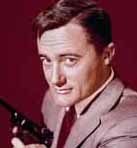 The show that pretty much programmed every spy show since its debut featured a suave, super cool American spy with the unforgettable name of Napoleon Solo (played by veteran actor Robert Vaughn). The imperturbable Solo used his brains as much as he used his brawn to solve his spy assignments. In fact, his brawn was often not much to write home about as he was knocked to the ground and tied up by the bad guys as often as he bested them in fisticuffs.
The show that pretty much programmed every spy show since its debut featured a suave, super cool American spy with the unforgettable name of Napoleon Solo (played by veteran actor Robert Vaughn). The imperturbable Solo used his brains as much as he used his brawn to solve his spy assignments. In fact, his brawn was often not much to write home about as he was knocked to the ground and tied up by the bad guys as often as he bested them in fisticuffs. 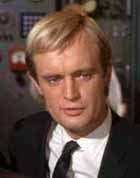 His partner, Russian super spy Illya Nickovitch Kuryakin (David McCallum, a bit of a newcomer to American audiences) was an interesting, enigmatic, sarcastic man of action who offered as much sex appeal for the ladies as he revealed embarrassment over that very appeal. Many NBC executives initially thought that the character, with his mop of blond hair and youth appeal, was a bad idea. They thought that this Russian hippy should have been gotten rid of. Some even worried that viewers would think he was gay and we can’t have gays on TV in 1965! In fact, the Illya character was initially only cast as a semi-regular character but once fans saw the chemistry between Napoleon and his pal Illya, they couldn’t get enough and Illya’s role was bumped up to co-star. Illya’s past was a bit cryptic and he was certainly never called a Soviet. The closest viewers got to learning about Illya’s personal past was when we learned that he went to the University of Georgia… not the one in the southern state but the Russian one!
His partner, Russian super spy Illya Nickovitch Kuryakin (David McCallum, a bit of a newcomer to American audiences) was an interesting, enigmatic, sarcastic man of action who offered as much sex appeal for the ladies as he revealed embarrassment over that very appeal. Many NBC executives initially thought that the character, with his mop of blond hair and youth appeal, was a bad idea. They thought that this Russian hippy should have been gotten rid of. Some even worried that viewers would think he was gay and we can’t have gays on TV in 1965! In fact, the Illya character was initially only cast as a semi-regular character but once fans saw the chemistry between Napoleon and his pal Illya, they couldn’t get enough and Illya’s role was bumped up to co-star. Illya’s past was a bit cryptic and he was certainly never called a Soviet. The closest viewers got to learning about Illya’s personal past was when we learned that he went to the University of Georgia… not the one in the southern state but the Russian one!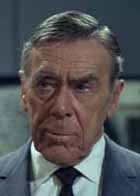 Acting as the guiding hand over this pair of super agents was their boss, Alexander Waverly, leader of U.N.C.L.E. Waverly was played by veteran actor Leo G. Carroll who brought a grandfatherly, legitimizing presence to the series.
Acting as the guiding hand over this pair of super agents was their boss, Alexander Waverly, leader of U.N.C.L.E. Waverly was played by veteran actor Leo G. Carroll who brought a grandfatherly, legitimizing presence to the series.And what of this U.N.C.L.E.? Well it was an acronym that stood for the United Network Command for Law and Enforcement, an international organization funded by all the world’s nations and its chief duty was to protect the world from the big bad organization named THRUSH. The bad guys were never fully identified in the series (though the novelizations labeled them the “Technological Hierarchy for the Removal of Undesirables and the Subjugation of Humanity”) but they were an organization with resources that rivaled that of U.N.C.L.E.’s and were its polar opposite on the evil scale. Worse than the Nazis, worse than world-wide communism, THRUSH wanted no less than to rule the world.
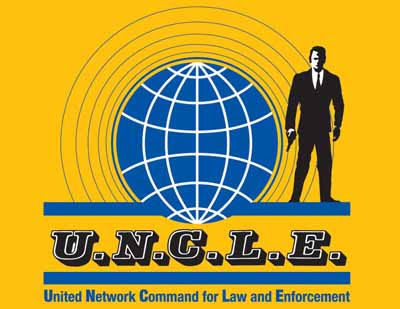 The show came just as science, technology, jet airplanes, computers, and threats of nuclear war were hectoring the civilized world. Our men from U.N.C.L.E. proved to be just the ticket to forget those worries for an hour each week with humor, action, and spy gadgets galore.
The show came just as science, technology, jet airplanes, computers, and threats of nuclear war were hectoring the civilized world. Our men from U.N.C.L.E. proved to be just the ticket to forget those worries for an hour each week with humor, action, and spy gadgets galore. One of the fan’s favorite parts of the show was the spectacular, if not just a bit fantastic, UNCLE Special pistol. “The Gun” was so popular that it got its own fan mail!
One of the fan’s favorite parts of the show was the spectacular, if not just a bit fantastic, UNCLE Special pistol. “The Gun” was so popular that it got its own fan mail!As I noted, the first season wasn’t a big hit during most of the season but led by PR man Chuck Painter, during the tail of the first season’s air dates the publicity department went into overtime and stars Vaughn and McCallum went on junkets all across the country to sell the show for a second season. It was a brilliant move because as viewership began to grow, especially for the Summer re-runs, teen fan magazines, newspapers and magazines, and other TV shows began to take notice. By the launch of season two “The Man From U.N.C.L.E.” was a bona fide hit. In fact, it was not just a hit, but a cultural phenomenon. It wasn’t long before people began to notice that the USA ground to a halt during U.N.C.L.E. night!
The show was truly international, too. Set in Africa, England, Austria, and any number of countries both made up and real, the show hopped back and forth across the globe every week all thanks to the massive, decades old sets at MGM where the show was filmed. Without ever leaving the studio’s back lots U.N.C.L.E. was all at once everywhere in the world. And that reach translated into ratings abroad, too. U.N.C.L.E. wasn’t *just* an American spy show. It truly felt like the world’s spy show.
For two seasons U.N.C.L.E. was the top show on TV. Unfortunately, the show’s own producers lost touch with what made the show a hit and its third season descended into Batman-styled campy comedy. Fans began to get discouraged but many were ready for season four which, when it debuted, proved that the show was back on track and more serious as a spy show. But for the TV executives it was too little too late. Season four was canceled after only 16 episodes of the usual 30 or so.
But after its end, all at once, U.N.C.L.E. went from the most popular shows in TV history to nearly forgotten. Worse, after its cancelation, U.N.C.L.E. faced a series of particular problems that kept it mostly off the air and out of the sort of syndication that gave long life to such shows as “Lost In Space,” and most especially “Star Trek.” It wasn’t long before “Man From U.N.C.L.E.” faded to just a childhood memory for millions.
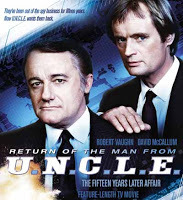 In 1983, new producers tried a reunion movie that, while the ratings were fairly good and fans generally liked it, didn’t excite the networks enough to draw an order for a new series. Rumor had it that Vaughn was up for a new series but McCallum wasn’t as enthusiastic, so even if it had been picked up, it may have been shy one of its leads.
In 1983, new producers tried a reunion movie that, while the ratings were fairly good and fans generally liked it, didn’t excite the networks enough to draw an order for a new series. Rumor had it that Vaughn was up for a new series but McCallum wasn’t as enthusiastic, so even if it had been picked up, it may have been shy one of its leads.And that leads us to 2015 and we’ve got an updated film with Guy Ritchie’s “Man From U.N.C.L.E.”
Ritchie has some big spy shoes to fill, too. After all, the germ of U.N.C.L.E. was born in the fertile mind of master spy author Ian Fleming who created James Bond.
The early U.N.C.L.E. treatment was written by Fleming, though most of his ideas were discarded when show runners Sam Rolfe and Norman Felton retooled Fleming’s ideas for what would become U.N.C.L.E. Still, without Fleming’s imprimatur, the show might not have gotten off the ground at all. One of the key Fleming aspects of the show, though, was the name Napoleon Solo which stuck almost even becoming the name of the show: “Ian Fleming’s Solo.”
Fleming, who was ill at the time and having too many other legal issues, sold the rights for “Solo” to Norman Felton for the grand sum of one pound. Felton and writer Sam Rolfe both retooled the premise and made it into what we now know as “The Man From U.N.C.L.E.”
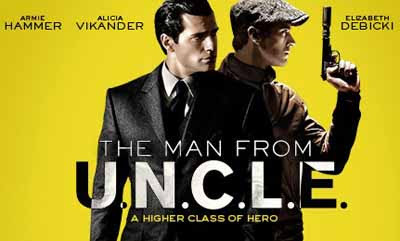 The Review
The Review
So, what of this newest version? Well, director Guy Ritchie is known for smash-bang action and hyper-kinetic movies, but in U.N.C.L.E., Ritchie seems to have made a bit more of an effort for style over kinetics and for the most part his decision was a good one.
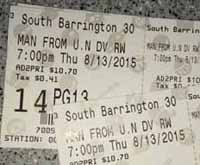 Ritchie’s U.N.C.L.E. is suave, cool, stylish, and a wonderful harkening back to the old-style 1960s spy genre. But it is also reminiscent of the good old 60s/70-s heist films and is paced just the same way in many respects. We meet the players, are introduced to the mark and his object of desire, learn the plan, then watch the heist as it unfolds. It is a harkening to the heist film even down to the split-screen effects showing the two agents simultaneously doing their various separate parts of the scheme (the split-screen effect is used sparingly here, so don’t worry if you aren’t a fan of that technique).
Ritchie’s U.N.C.L.E. is suave, cool, stylish, and a wonderful harkening back to the old-style 1960s spy genre. But it is also reminiscent of the good old 60s/70-s heist films and is paced just the same way in many respects. We meet the players, are introduced to the mark and his object of desire, learn the plan, then watch the heist as it unfolds. It is a harkening to the heist film even down to the split-screen effects showing the two agents simultaneously doing their various separate parts of the scheme (the split-screen effect is used sparingly here, so don’t worry if you aren’t a fan of that technique). ne thing is certain, this this film is not a typical, modern action flick. This isn’t the loud, obnoxious, fare we are used to seeing these days. It isn’t a frantic, Michael Bay-ish, trip filled with constant explosions, dizzying camera cuts, and million-decibel explosions with a soundtrack that hits your ears like a sledgehammer. This movie is style and grace with just enough action–and realistic action, at that–to add that level of excitement one needs in a spy flick. Ritchie also imbued this film with a great, easy going humor. It is adult humor, too. Not “adult” as in raunch or sex humor, but adult as in smart and grown up. Perhaps the best way to explain it is that it is droll. There is no slapstick, loud, guffawing humor here. The closest to guffaws we get is in how one of the bad guy dies. In any case, it works very well.
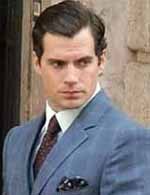 As Napoleon Solo, Henry Cavili is just as smooth and imperturbable as Robert Vaughn was. Cavill channeled the Solo mystique perfectly. Cavill’s Solo is perpetually unfruffled, smooth and always in control–even when he wasn’t… in control, I mean. Old time fans may not quite appreciate this Napoleon’s past that gets him into the spy game, but his character during the film’s time period is a perfect Man From U.N.C.L.E. characterization.
As Napoleon Solo, Henry Cavili is just as smooth and imperturbable as Robert Vaughn was. Cavill channeled the Solo mystique perfectly. Cavill’s Solo is perpetually unfruffled, smooth and always in control–even when he wasn’t… in control, I mean. Old time fans may not quite appreciate this Napoleon’s past that gets him into the spy game, but his character during the film’s time period is a perfect Man From U.N.C.L.E. characterization.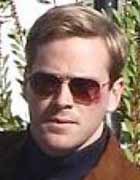 Illya Kuryakin, played by Armie Hammer, is the biggest departure from the original TV character. And if old time fans might raise an eyebrow at the earlier history Ritchie gives his Napoleon Solo, they might be a bit quite a bit more miffed at how Ritchie wrote his Kuryakin. Hammer, though, does a wonderful job with the character and we come away with a deep feeling and understanding for this new Illya, one that we never were able achieve for David McCallum’s utterly enigmatic, even inscrutable, 1965 Illya (I mean, that was due to the original show’s writing, not McCallum’s then wonderful performance).
Illya Kuryakin, played by Armie Hammer, is the biggest departure from the original TV character. And if old time fans might raise an eyebrow at the earlier history Ritchie gives his Napoleon Solo, they might be a bit quite a bit more miffed at how Ritchie wrote his Kuryakin. Hammer, though, does a wonderful job with the character and we come away with a deep feeling and understanding for this new Illya, one that we never were able achieve for David McCallum’s utterly enigmatic, even inscrutable, 1965 Illya (I mean, that was due to the original show’s writing, not McCallum’s then wonderful performance).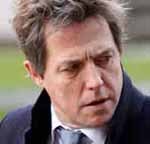 As to Mr. Waverly, perfectly played by Hugh Grant, well, let’s just say the less said about him by a reviewer the better because it is nearly impossible to even discuss the character without messing up the movie for those who have yet to see the film. Suffice to say, Ritchie’s Mr. Waverly is just right for this new U.N.C.L.E. universe.
As to Mr. Waverly, perfectly played by Hugh Grant, well, let’s just say the less said about him by a reviewer the better because it is nearly impossible to even discuss the character without messing up the movie for those who have yet to see the film. Suffice to say, Ritchie’s Mr. Waverly is just right for this new U.N.C.L.E. universe.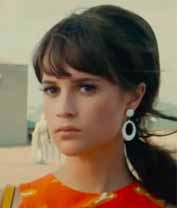 Next we get to this film’s “girl” from U.N.C.L.E., if you will. Alicia Vikander is at once the classic “innocent,” yet capable, sly, even underhanded, but also entirely sympathetic. You’ll love her Gaby Teller. She is a little firecracker, this new “girl.”
Next we get to this film’s “girl” from U.N.C.L.E., if you will. Alicia Vikander is at once the classic “innocent,” yet capable, sly, even underhanded, but also entirely sympathetic. You’ll love her Gaby Teller. She is a little firecracker, this new “girl.” By “classic innocent,” I mean to say that this was one of the essential conventions of the old TV series. Our two favorite U.N.C.L.E. agents would be given an assignment but invariably some “normal” person would come between the agents their attempt to save the world. So the “innocent” would have to be saved at the same time she (the innocent was usually a she) gets sucked into the plot to help our U.N.C.L.E. agents save the world. Vikander’s Gabby fills this role for much of the film. But I won’t say why that changes. You’ll have to figure that out by going to see the film.
As to the big baddies, well you want them all dead. Victoria Vinciguerra (Elizabeth Debicki) and her husband Alexander Vinciguerra (Luca Calvani) as well as mean, old ex-Nazi–are they ever REALLY EX-Nazis—Uncle Rudi (Sylvester Groth) are all deliciously evil without being entirely cartoonish.
A word about our female leads. Both Vikander and Debicki give their roles much more depth than the typical 1960s fare. Vikander is far more capable in a meaningful, more subtle way than audiences would have seen in the 60s. A strong female character in the 60s was usually the hard-charging, smart-mouthed, tough-as-nails woman who beat audiences over the head with her toughness, but Vikander gives us a capable woman who doesn’t have to talk like a street tough to tell us how capable she is. And Debicki, while she doesn’t get nearly as much screen time, gives us a baddie that we can believe and hate, but, while she has some cliché to her role, her big baddie isn’t utterly cartoonish.
Now, to be sure this is an origins film. We see U.N.C.L.E. before there is U.N.C.L.E. In fact, if you’ve seen the trailers, you know that early in the film Solo and Kuryakin consider themselves Cold War enemies–real, enemies, not just rivals. In fact, early–as the trailers show–they try to kill each other. But Ritchie does an excellent job developing their relationship in the short time he has to do it. We come away believing that this American smart alec and this Russian tough guy have seen the strengths in each other, tested those strengths, and become a close knit team as a result. In my opinion, audiences will believe that this Solo and this Illya have learned to respect and rely in each other’s particular skill sets. Their relationship isn’t forced at all.
The music is also used to great effect, here. The soundtrack, written by Daniel Pemberton, has a great international feel, but it also evokes the 1960s in both the feel of the often jazz-like sounds. But it also evokes a separate 60s/70s film genre: the Spaghetti Western. Some of the tracks really bring Ennio Morricone to mind. The soundtrack is another stand out in the respect that it isn’t like so many obnoxious, blaring, obtrusive ones we hear in too many films today. This music isn’t just modern songs ladled on top of a 1960s era set piece–like too many films are today–but a fully realized soundtrack that was fashioned to “fit” in 1963. And, it doesn’t hit you over the head. Also, for lovers of the old Jerry Goldsmith/Hugh Montenegro U.N.C.L.E. theme that was so popular in 1966, if you listen real close you’ll catch a few seconds of it. It isn’t in the soundtrack, mind you, but that great old theme is given a nod in this film. But don’t blink or you’ll miss it.
Finally, the ending of this film tells the viewer that if there is to be a sequel we will find that the U.N.C.L.E. organization is fully realized by the time we all meet again. In fact, for the true fans, the ending credits will give them a whole lot to talk about… and, again, some older fans may be a tad ticked off at the “flawed hero” theme that Ritchie has built for his own men from U.N.C.L.E. So, keep your eye out as the closing credits fly by. There is some very interesting back stories about our new Men and Girl in these credits.
In all, this movie is a 4 out of 5 stars. My only complaint is that a few of the ways the plot is advanced is a bit precious, or pat if you will, including the somewhat touching moment with Solo and Illya in the hotel room at the end. But that is so entirely minor that it doesn’t really distract from them film.
I say do not wait for this to come out on video. Do the studios a favor and let your $10.50 count for the box office take. If we want a sequel, and I think Ritchie deserves one with this outing, we need a little box office mojo.
Guy Ritchie’s Man From U.N.C.L.E. is worth your time, movie goers. It will also likely satisfy the hardcore U.N.C.L.E. fans, too, if they can get past the “flawed hero” tact that Ritchie takes with those heroes of 50 years ago.
********
Warner Todd Hustonis a Chicago based freelance writer. He has been writing news, opinion editorials and social criticism since early 2001 and before that wrote articles on U.S. history for several American history magazines. Huston is a featured writer for Andrew Breitbart’s Breitbart News, and he appears on such sites as RightWingNews.com, CanadaFreePress.com, Wizbang.com, and many, many others. Huston has also appeared on Fox News, Fox Business Network, CNN, and many local TV shows as well as numerous talk radio shows throughout the country.
Warner Todd Huston on the web:
Tumblr
Published on August 14, 2015 15:50
No comments have been added yet.

